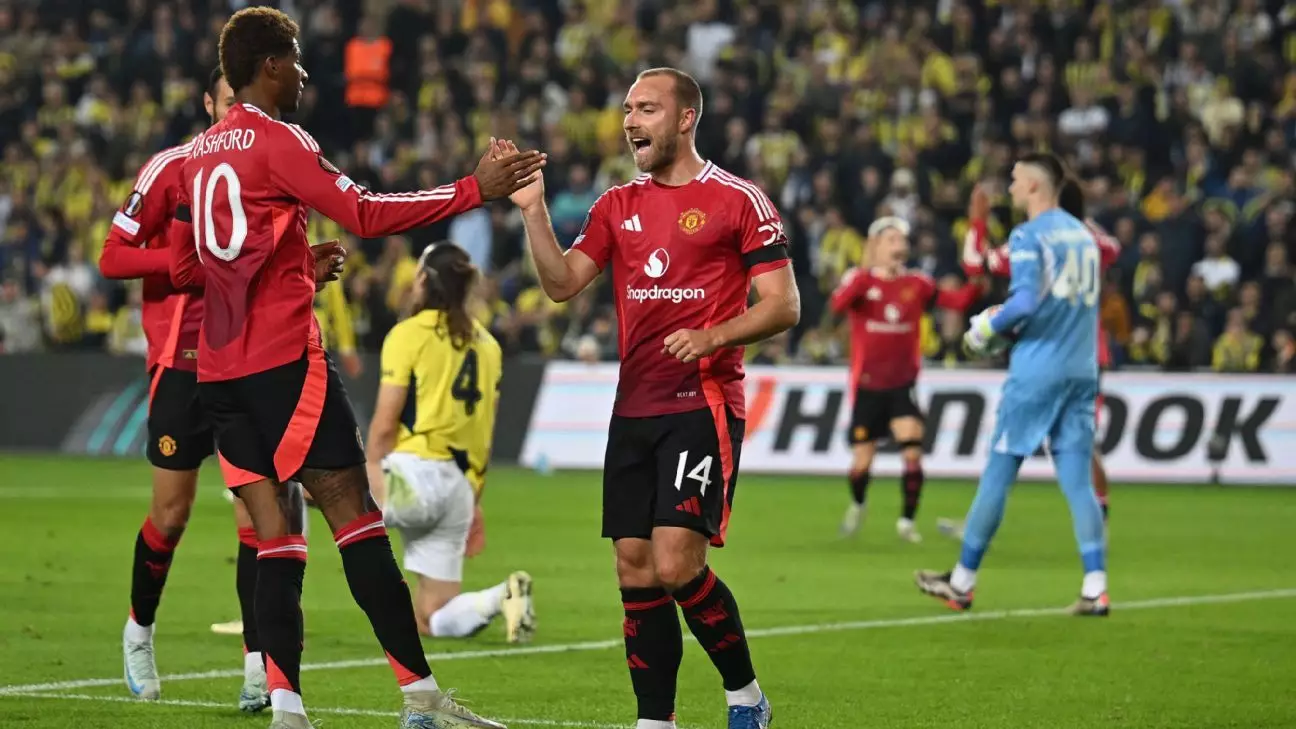Manchester United continues to grapple with their inconsistency in the UEFA Europa League, as reflected in their recent 1-1 stalemate against Fenerbahce in Istanbul. Despite a promising start, Erik ten Hag’s charges showcased vulnerabilities that have become all too familiar this season. This article seeks to dissect the match, evaluate tactical choices, and project future implications for United in this European campaign.
The match began on a high note for the Red Devils when Christian Eriksen netted the opening goal in just the 14th minute. Capitalizing on a swift counter-attack that involved dynamic interplay among Eriksen, Alejandro Garnacho, and Joshua Zirkzee, United momentarily appeared cohesive. However, this early advantage highlighted a recurring issue; they failed to build upon their lead. After filtering through the initial euphoria, it became evident that United’s inability to maintain momentum would pave the way for Fenerbahce to retaliate.
Just after halftime, Youssef En-Nesyri capitalized on a defensive lapse, heading in the equalizer and shifting the match’s momentum. This validated concerns over United’s defensive capabilities, particularly the handling of aerial threats—a problem exacerbated by the absence of Harry Maguire, whose experience could have provided much-needed stability.
Erik ten Hag’s managerial acumen was put to the test with Bruno Fernandes suspended, prompting tactical experimentation that yielded mixed results. Deploying Noussair Mazraoui in a No. 10 role and shifting Lisandro Martínez to left-back seemed a gamble that did not pay off. Martínez appeared out of sorts, often conceding ground to his counterpart and failing to provide solid defensive cover. Mazraoui, too, struggled to assert himself in a role he wasn’t accustomed to, leading to moments of frustration that were evident throughout the match.
Despite tactical adjustments, the fluidity of United’s attack diminished after Eriksen’s opening goal. Key players like Marcus Rashford failed to capitalize on scoring opportunities, highlighting a concerning lack of composure. The burden of expectation weighs heavily on Rashford, whose performance oscillates between brilliance and indecision at crucial moments.
Defensive Frailties Explored
The game also exposed Manchester United’s defensive vulnerabilities, particularly from set-pieces and wide deliveries. Fenerbahce’s wingers exploited this weakness, directing multiple threatening balls into the box—often met with confusion by Victor Lindelöf and Matthijs de Ligt. While Lindelöf made several crucial interceptions, his inability to adequately address Fenerbahce’s equalizer calls into question the defensive structure essential for success in high-stakes matches.
Moreover, André Onana’s performance was a mixed bag. While he delivered an exceptional double save in the first half, his inability to command aerial situations and maintain clean sheets reflects the exacerbating challenges inherent in United’s defensive strategy.
Among the players, Christian Eriksen stood out with his proactive and influential presence in midfield. He not only scored the opening goal but also dictated the tempo, showcasing an ability to read the game effectively. Manuel Ugarte also exhibited promise defensively, although he needs to enhance his contributions going forward. In contrast, players like Marcus Rashford and Lisandro Martínez need to find consistency to invigorate United’s attacking potential and defensive solidity.
As United now hold three points from their opening three matches in the Europa League, their position in the table remains precarious. They may currently occupy 21st place, just within the qualification zone for knockout phase play-offs, but the road ahead is fraught with challenges. Matches against robust teams like PAOK, Rangers, and Bodo/Glimt will require decisive improvements if United harbors hopes of advancing.
Manchester United’s journey in the Europa League is fraught with uncertainty, reflecting broader trends in their current season. The draw against Fenerbahce has amplified discussions around squad depth, tactical awareness, and player adaptability. As the calendar progresses, it will be crucial for Erik ten Hag to refine his strategies, stabilize his defensive selections, and foster better connections between the forward line and midfield.
It remains to be seen if United can overcome their Europa League hurdles, but one thing is clear: the time for complacency is over. Each match in this competition now holds immense weight, and it is necessary for the Red Devils to transform their promising moments into tangible success on the European stage. Only through cohesive play, strategic savvy, and capitalizing on opportunities can Manchester United hope to reclaim their former status as consistent contenders in European football.

